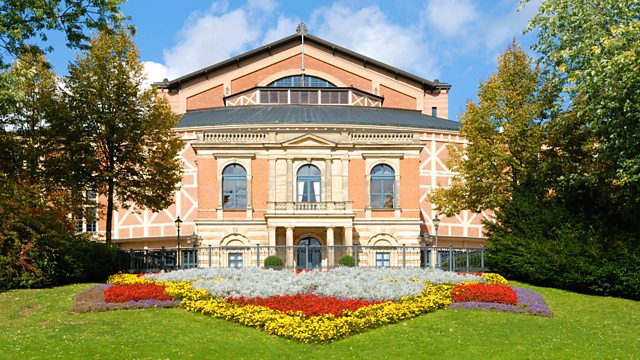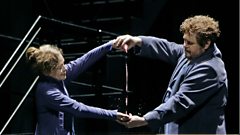
Wagner's Tristan und Isolde
Christian Thielemann conducts Wagner's Tristan und Isolde at the 2015 Bayreuth Festival, with Stephen Gould and Evelyn Herlitzius in the title roles. Presented by Gavin Plumley.
From the Bayreuth Festival '15, recorded in July at the Festspielhaus, Wagner's Tristan und Isolde, with Stephen Gould and Evelyn Herlitzius as the doomed lovers seeking redemption in death. Christian Thielemann conducts a critically-acclaimed account of this highly influential opera, in a new production directed by Wagner's great-granddaughter, the Festival Director Katharina Wagner, marking the 150th anniversary of its premiere. Presented by Gavin Plumley.
Tristan ..... Stephen Gould (tenor)
Isolde ..... Evelyn Herlitzius (soprano)
King Mark ..... Georg Zeppenfeld (bass)
Kurwenal ..... Iain Paterson (baritone)
Melot ..... Raimund Nolte (tenor)
Brangäne ..... Christa Mayer (mezzo-soprano)
Young Sailor/Shepherd ..... Tansel Akzeybek (tenor)
Steersman ..... Kay Stiefermann (baritone)
Bayreuth Festival Chorus
Bayreuth Festival Orchestra
Christian Thielemann, conductor.
Last on
More episodes
Synopsis
Ireland and Cornwall are at war. Engaged to be married to the Irish princess Isolde, the Irish champion Morold travels to Cornwall to levy the taxes owed to his country, but on his arrival he is killed by Tristan, a knight in the service of King Marke. Tristan is wounded in the combat and is forced to sail to Ireland under the name of Tantris in the hope of being cured by Isolde, whose medicinal arts are well known. She recognizes him on his sickbed and wants to kill him then. As she raises the sword to strike off his head, he looks into her eyes. He realizes that she knows who he really is. She lets the sword drop. Both of them vow to say nothing more about the incident. She will not betray him to her Irish countrymen, and he will not reveal that she has spared his life. After a while, Tristan returns to Cornwall, cured. He mediates between the enemy forces and arranges for Isolde to marry the widowed Marke. As a result, Tristan – the nephew of the childless king – forgoes his rightful inheritance and concludes a peace deal between Ireland and Cornwall. He brings Isolde to Cornwall by ship in order for her to meet her new husband.
��
Act I
Isolde has fallen in love with Tristan while nursing him back to health. But now, on board the ship that is to take her to Marke, she feels like a chattel, and hates Tristan for the fact that he evidently does not return her feelings.
He avoids her and refuses to speak to her. Isolde vacillates between obstinacy and sudden incomprehensible outbursts of hatred directed against herself, against the sea that is bearing her to an unknown husband in a foreign land and against Tristan. She finally opens up to her confidante, Brangäne, and tells her how Tristan once treated her. But Brangäne does not realize that Isolde is telling her about her love for Tristan. She thinks that his plans for marrying her off to Marke are a way of showing her his gratitude for healing him.
For his part, Tristan finally realizes that he can no longer avoid speaking to Isolde. He confronts her defiantly. She tells him that the death of the man to whom she was engaged has not been properly atoned for. Tristan is shaken. He now sees what he has done to Isolde, and wants to atone for his guilt.��
He realizes that the cup of atonement is a death potion and drinks it. Isolde has already sworn that it will bring ‘Death to us both!’ and snatches the cup from his lips in order to drink what remains. They both await their deaths. Their eyes meet. Conscious that they have only a few more moments to live, they lose their fear of not being loved in return and admit their feelings for each other.��
Brangäne feels guilty at bringing them together; it was she, after all, who replaced the death potion by the love potion. Isolde is taken ashore to marry King Marke. Tristan will go on living, loving Isolde and, in keeping with his promise, delivering her up to the king.
Act II
Isolde and Marke are now married.
As often as she can, Isolde meets Tristan in secret, while Brangäne keeps watch
in order to prevent them from being caught. Tristan’s comrade-in-arms,
Kurwenal, also knows about the relationship, as does Melot, who
has proved particularly inventive in arranging the lovers’ meetings. This time
he has suggested a night-time hunt so that Tristan and Isolde will be
undisturbed. Brangäne suspects that Melot is double-crossing the lovers and is
afraid that they will be caught. But nothing can stop Isolde from summoning
Tristan to her side.
Once again Tristan and Isolde
discuss their old wounds and misunderstandings.
She reproaches him for selling himself to the ‘world of day’, a world of
superficial fame and splendour in which he was determined to perform the heroic
feat of taming the
wild Irish maid and bringing her to Cornwall as a peace offering. He tries to
explain
that she seemed unattainable. He speaks increasingly of himself and his longing
for death. He begs Isolde to follow him into his true realm, the realm of
night. More and more, the pair abandon themselves to each other,
unconditionally, no longer heeding Brangäne’s warnings.
King Marke has indeed allowed
himself to be persuaded by Melot to set a trap for
the lovers in order to catch them red-handed. He cannot understand how he has
been deceived. It is not the foreigner Isolde whom he calls to account, but
Tristan, who advised him to marry. Marke, who they all call ‘good King Marke’,
is devastated to discover that his goodness can cause so much suffering.
Tristan provokes the treacherous Melot to fight with him. But he uses the
opportunity to throw himself on Melot’s sword. Once again he seeks death.
Isolde cannot follow him.
��
Act III
Kurwenal has brought his badly wounded master back home to his ancestral castle. Tristan is close to death, but as long as Isolde remains alive and is not near him, he cannot die. In his delirium he realizes that life itself is a source of guilt. Did his father not die shortly after he, Tristan, was conceived? And did his mother not die at his birth?
Kurwenal can scarcely bear Tristan’s anguish. He tells him that Isolde is coming and even that he can already make out the ship that is bringing her to him. When Isolde actually arrives, Tristan collapses, dead. He has achieved his destiny. Once again Isolde complains at the loyal Tristan’s lack of loyalty for quitting this world without her. Kurwenal cannot bear to lose Tristan and rages against all who now enter. He strikes down Melot, throws Brangäne to the ground and even lunges at King Marke in his fury.
Isolde is oblivious to all that is going on around her. She sinks, as if transfigured, onto Tristan’s lifeless body, mystically uniting herself with him at last.��
Broadcast
- Sat 17 Oct 2015 17:00����ý Radio 3

